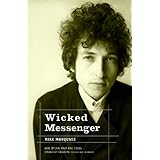
Average Reviews:

(More customer reviews)Have you ever wondered where Bob Dylan got some of his inspiration?
Have you ever wondered what went on behind the scenes when the politically active youth culture was born in the 60's?
Starting with stories about Bob's relationships with the "Dust Bowl Balladeers" and wandering along with the concert tours and digging deep into the history of SNCC (Students Nonviolent Coordinating Committee) and SDS ( Students for a Democratic Society), and everywhere else that was relevant this book masterfully chronicles the connection between the songs and times of the 60's and beyond.
The reader is treated to a deep view of what was going on as many of Bob's most beloved songs were written. You are given a clear picture of why Bob was such an honest and faithful reflection of our times and has become America's favorite balladeer.
I have to say that I think the title is unfortunate, there is nothing "Wicked" about this messenger. The things he protests are outrageous things and he finds exactly the right words and the courage to sing them out with songs that can not be ignored. He also has made some of the most touching and romantic love songs that I have ever heard. I'm very glad to have been able to see some of the background behind his inspiration.
Finally, I understand why Bob was not at Woodstock, why he "went electric", what went on during the London tours, who was the "girl on that album cover", and many other things.
This is clearly a fascinating book that has helped me to better understand the times that I lived through even better.
Click Here to see more reviews about: Wicked Messenger: Bob Dylan And the 1960s
Bob Dylan's abrupt abandonment of overtly political songwriting in the mid-1960s caused an uproar among critics and fans. In Wicked Messenger, acclaimed cultural-political commentator Mike Marqusee advances the new thesis that Dylan did not drop politics from his songs but changed the manner of his critique to address the changing political and cultural climate and, more importantly, his own evolving aesthetic. Wicked Messenger is also a riveting political history of the United States in the 1960s. Tracing the development of the decade's political and cultural dissent movements, Marqusee shows how their twists and turns were anticipated in the poetic aesthetic—anarchic, unaccountable, contradictory, punk— of Dylan's mid-sixties albums, as well as in his recent artistic ventures in Chronicles, Vol. I and Masked and Anonymous.Dylan's anguished, self-obsessed, prickly artistic evolution, Marqusee asserts, was a deeply creative response to a deeply disturbing situation. "He can no longer tell the story straight," Marqusee concludes, "because any story told straight is a false one."
Click here for more information about Wicked Messenger: Bob Dylan And the 1960s

0 comments:
Post a Comment